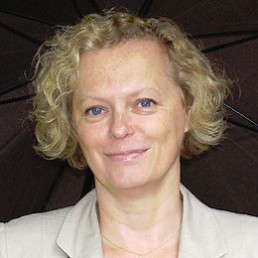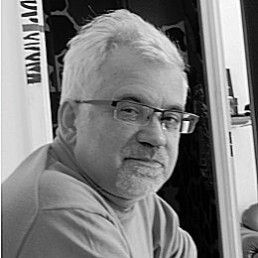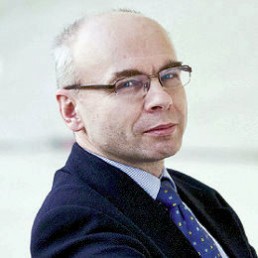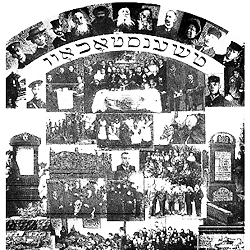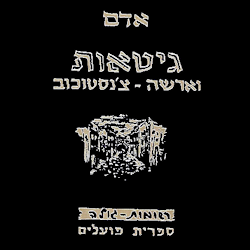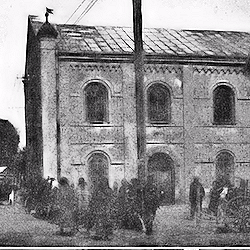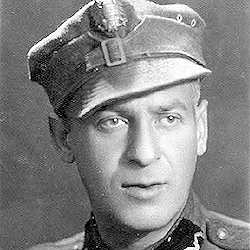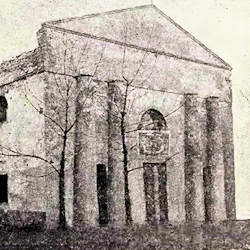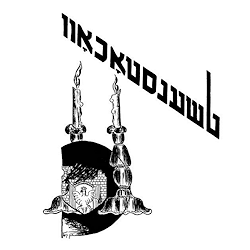Academic Consultative Panel
Academic Consultative Panel
- preserving the words of our Holocaust Survivors for future generations
WHY DO WE HAVE AN ACADEMIC CONSULTATIVE PANEL?
In order to aid in the accuracy of the facts, contained in the texts of authors in the Yizkor Book translations within our Częstochowa Yizkor Book Project, we have formed an Academic Consultative Panel, comprising four outstanding Polish historians, who each have considerable knowledge and experience in the Jewish history of Poland.
The World Society is very fortunate to have found DAVE HOROWITZ-LAROCHETTE as our translator who, not only translates from Hebrew AND Yiddish, but is also pedantic as to the accuracy of his translations. He is also very aware of any historical anomalies that arise and he goes above and beyond the call of duty when it comes to explanations to help the reader more fully understand the text. This is attested to by the many footnotes which he adds to his translations.
When details of a particular incident, from before, during or after the War, differ in the account of one Yizkor Book article writer, from details about the SAME incident as written by another Yizkor Book article writer, these anomalies will be referred to the Academic Consultative Panel for their opinion. These anomalies usually relate to differences in dates, the names of the Nazis involved, the names and numbers of victims and even the names of streets and places which may have since changed. While the text of the article will be translated as written by the author, the Panel’s opinion will be included as a footnote on the appropriate page.
We believe that having this panel of experts will further our aim and obligation – to translate, into English, ACCURATELY AND COMPLETELY, the words of Holocaust Survivors speaking, from the “beyond the grave”, to us and to future generations.
THE ACADEMIC CONSULTATIVE PANEL
Professor Dr. hab. JERZY MIZGALSKI
Professor Mizgalski is a long-term friend of the World Society of Częstochowa Jews & Their Descendants, having been the creator and curator of “The Jews of Częstochowa” exhibition, which has now found a permanent home in the Częstochowa Jewish Museum. He has served the Pedagogical University in Częstochowa (now the Jan Długosz University in Częstochowa) as Deputy Dean for Student Affairs in the Faculty of Philology and History and as Deputy-Rector for Teaching and Student Affairs. One of his special academic achievements is the development of research into the history of the Jewish population in Częstochowa in the 20th century. Professor Mizgalski has written three monographs, forty-four chapters in monographs and academic articles and edited or co-edited thirteen collective works.
Professor Dr. hab. MAGDALENA RUTA
Professor Magdalena Ruta, a native of Częstochowa, is Associate Professor at the Institute of Jewish Studies at the Jagiellonian University in Kraków, where she teaches Yiddish language and literature. She has translated several prose works from Yiddish into Polish and published numerous articles on modern Yiddish literature and culture. She is the editor of several books, among them being Under the Red Banner: Yiddish Culture in the Communist Countries in the Post-war Era (co-edited with Elvira Groezinger, 2008), and a tri-lingual (Yiddish-Polish- English) anthology, Nisht bay di taykhn fun Bovl / Not on the Rivers of Babylon: An anthology of Yiddish Poetry in the post-WW2 Poland, (2012). Her monographs include Without Jews? Yiddish Literature in the People’s Republic of Poland on the Holocaust, Poland and Communism (2012).
Professor Dr. hab. JANUSZ SPYRA
Professor Janusz Spyra, a history graduate from the Jagiellonian University in Kraków, is a professor at the Institute of History at the Jan Długosz University of Humanities and Sciences in Częstochowa. He is the author of nine monographs, incl. Rabbiner in der Provinz. Die Rolle des Rabbiners im Leben der jüdischen Gemeinschaft in Teschener und Troppauer Schlesien, Peter Lang Verlag, Berlin, Bern, Bruxelles, New York, Oxford, Warsaw, Vienna 2018 and over two hundred academic articles. He specialises in the history of Górny Śląsk (Upper Silesia) Jewry in modern times in Upper Silesia, especially in Cieszyn Silesia.
Professor Dr. hab. DARIUSZ STOLA
Professor Stola is former Director of the POLIN Museum of the History of Polish Jews. He is a renowned historian and is currently a professor at the Institute for Political Studies in the Polish Academy of Sciences. He specialises in the history of the Holocaust, Polish-Jewish relations, human migrations and in the history of Poland’s post-War Communist regime. He has authored and edited numerous books, and over one hundred scholarly works. In recognition of his achievements, Professor Stola has received numerous scholarships, awards and accolades.
Click HERE to return to Częstochowa Yizkor Books Project main page.
The Częstochowa Yizkor Books Project has been made possible by the financial support of the
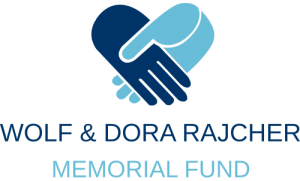
Wolf Rajcher z”l and Dora Rajcher z”l were both Holocaust survivors from Częstochowa.
They were prisoners in both the “Big Ghetto” and the “Small Ghetto” and, until liberation, were slave labourers in HASAG-Pelcery. Following the War, they emigrated to Melbourne Australia.
Upon the passing of both his parents, their son, Andrew Rajcher, established this charitable fund in their memory.
Czenstochower Yidn
The Jews of Częstochowa (1947)
Czenstochower Yidn
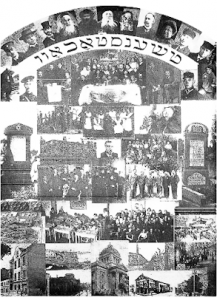 This Yizkor Book was published in New York, in 1947, by the United Czenstochower Relief Committee & Ladies Auxiliary. In all probability, it is the second Yizkor Book, relating to Częstochowa, to be published after the War, second only to Adam Zilbersztajn’s “The Ghettoes – Warsaw, Częstochowa“. So that, to the book’s contributors, their memories would still be very fresh.
This Yizkor Book was published in New York, in 1947, by the United Czenstochower Relief Committee & Ladies Auxiliary. In all probability, it is the second Yizkor Book, relating to Częstochowa, to be published after the War, second only to Adam Zilbersztajn’s “The Ghettoes – Warsaw, Częstochowa“. So that, to the book’s contributors, their memories would still be very fresh.
According to this Yizkor Book’s Editorial Committee:
The “Kehilla” of 30,000 Jewish souls in Częstochowa, with the exception of a small remnant, shared the fate of the 3,500,000 Polish Jews and of the six million Jewish victims of Nazism and Fascism in Europe. Yet our book, “Czenstochower Yidn”, was not created as a stone “matzevah” in the cemetery of Jewish Częstochowa, but as a “Book of Life”.
The writing of this “Book of Life”, about all of the generations and layers of Jewish population who struggled and who created our home city, was our duty. The memory of Jewish Częstochowa has been sanctified a thousand-fold by the martyred deaths of our brothers and sisters.
Our “Book of Life”, “Czenstochower Yidn” is also our “Book of Lineage”. The Częstochowa neighbourhood, which was built and inhabited by Jews, is now either utterly ruined or settled by non-Jews. A large number of institutions, which were the pride of the Jewish community, will most likely be taken over by strangers. All the Jewish streets, all the Jewish houses, all Jewish institutions belong to us. We will always take pride in them and honour those who created them.
This Yizkor book, in its entirety, has been professionally translated into English.
The professional English translation of this Yizkor book has been made possible by the financial support of the

Wolf Rajcher z”l and Dora Rajcher z”l were both Holocaust survivors from Częstochowa.
They were prisoners in both the “Big Ghetto” and the “Small Ghetto” and, until liberation, were slave labourers in HASAG-Pelcery. Following the War, they emigrated to Melbourne Australia.
Upon the passing of both his parents, their son, Andrew Rajcher, established this charitable fund in their memory.
Click on SECTION HEADINGS to reveal chapters.
Chapters are listed in the order in which they appear in the Yizkor Book.
(The numbers in brackets, after each article, correspond to the appropriate page numbers in the Yizkor Book.)
In translating the following “Who’s Who” section, every effort has been made to transliterate, from the Yiddish texts, as accurately as possible, the names as they would have been spelt in a historically, accurate manner (surnames may have been changed post-War). This includes the use of Polish diacritics where appropriate. (Such care and research may not have been carried out in translations of this section appearing elsewhere.)
Nevertheless, if you cannot find a name you seek here, please try alternate spellings: e.g. Rajcher/Reicher, Rubinsztajn/Rubinstein, Dembiński/Dębinski, Chorowicz/Horowicz, Nusyn/Nusen, Chiel/Chil, Rywka/Rifka, Sara/Sura, Jacob/Jakób/Jakub, etc.. Different spellings, such as these, may also impact any family tree genealogical research.
Should you need any advice regarding the appropriate Polish spellings of Jewish names or surnames, please feel free to contact the Webmaster.
ENGLISH TRANSLATION:
Dave Horowitz-Larochette
IMPORTANT NOTICE
While the English translation is available for download, it may not, either in part or as a whole, be distributed or published without the prior written permission of Andrew Rajcher, the copyright-holder of this English-language version of this Yizkor Book.
The Ghettos - Warsaw, Częstochowa
The Ghettos - Warsaw, Częstochowa (1945)
Possibly one of the first Yizkor Books published after World War II.
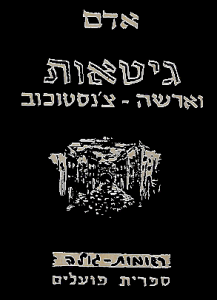 This Yizkor Book, by Adam Zilbersztajn, was published in Israel in December 1945. Of all the Yizkor Books relating to Częstochowa, this must be the earliest or one of the earliest to be published after the War.
This Yizkor Book, by Adam Zilbersztajn, was published in Israel in December 1945. Of all the Yizkor Books relating to Częstochowa, this must be the earliest or one of the earliest to be published after the War.
As such, the memories of the events, contained in this book, must have been very fresh in the author’s mind at the time of writing. This, according to Professor Dariusz Stola, former Director of the POLIN Museum of the History of Polish Jews, makes this book “an historical treasure”.
We do not know whether the author wrote the book’s chapters near the dates to which he refers in chapter headings (e.g. “Warsaw 1941), or at War’s end. Either way, his memories give us yet another vision of the tragic events in both Częstochowa and Warsaw.
We have known about the existence of this book for a long time and, for a long time, we have endeavoured to obtain a copy or scan of the book for us to be able to translate it into English. Thanks mainly to the efforts of World Society Vice-President Alon Goldman, we were able to receive a clear scan of the book, thus enabling us to have it professionally translated into English.
[Webmaster: As far as we know, this is the first PROFESSIONAL, English-language translation of this book.]
This Yizkor book has been PROFESSIONALLY translated into English
– for the FIRST TIME in its entirety!
To view or download a PDF scan of this original Yizkor Book in HEBREW,
click HERE
The professional English translation of this Częstochowa Yizkor book has been made possible by the financial support of the

Wolf Rajcher z”l and Dora Rajcher z”l were both Holocaust survivors from Częstochowa.
They were prisoners in both the “Big Ghetto” and the “Small Ghetto” and, until liberation, were slave labourers in HASAG-Pelcery. Following the War, they emigrated to Melbourne Australia.
Upon the passing of both his parents, their son, Andrew Rajcher, established this charitable fund in their memory.
English-translated chapters are listed below in the order in which they appear in the Yizkor Book.
(The numbers in brackets, after each article, correspond to the appropriate page numbers in the book.)
ENGLISH TRANSLATION:
Dave Horowitz-Larochette
IMPORTANT NOTICE
While this English translation is available for download, it may not, either in part or as a whole, be distributed or published without the prior written permission of Andrew Rajcher, this English-language version copyright-holder.
The Community of Żarki
The Community of Żarki (1959)
A Town in Its Life and in Its Destruction
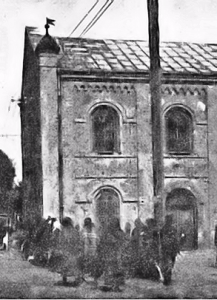 This Yizkor Book was published, in Israel in 1959, by the Organisation of Żarki Jews in Israel. Its Editor is Yitzchak Lador. The majority of its articles were written in Hebrew, while the articles in the last section, “Żarki in Life and in Death” were written in Yiddish.
This Yizkor Book was published, in Israel in 1959, by the Organisation of Żarki Jews in Israel. Its Editor is Yitzchak Lador. The majority of its articles were written in Hebrew, while the articles in the last section, “Żarki in Life and in Death” were written in Yiddish.
According to this Yizkor Book’s Organising Committee:
This book, which we have before us and which is dedicated to our ‘shtetl’, contains testimonies and memoirs near to the heart of all the Żarki landsleit, wherever they may be.
The book raises before our eyes Żarki’s distant and recent past, as well as the days of the Great Holocaust which passed over our town, until its bitter end, when all the people of the ‘shtetl’ were annihilated – and now only a few individuals are scattered throughout the globe, the majority in Israel.
It is our hope that this memorial endeavour will stand as a living monument for the younger generation and those of the future.
[Webmaster: As far as we know, this is the first COMPLETE, PROFESSIONAL, English-language translation of this book. To the best of our knowledge, prior to this, only the Table of Contents and Necrology seem to have ever been translated into English.]
This Yizkor book has been PROFESSIONALLY translated into English
– for the FIRST TIME in its entirety!
The professional English translation of this Żarki Yizkor book has been made possible by the financial support of the

Wolf Rajcher z”l and Dora Rajcher z”l were both Holocaust survivors from Częstochowa.
They were prisoners in both the “Big Ghetto” and the “Small Ghetto” and, until liberation, were slave labourers in HASAG-Pelcery. Following the War, they emigrated to Melbourne Australia.
Upon the passing of both his parents, their son, Andrew Rajcher, established this charitable fund in their memory.
Click on SECTION HEADINGS to reveal chapters.
Chapters are listed in the order in which they appear in the Yizkor Book.
(The numbers in brackets, after each article, correspond to the appropriate page numbers in the book.)
THE TOWN IN THOSE DAYS
ENGLISH TRANSLATION:
Dave Horowitz-Larochette
IMPORTANT NOTICE
While this English translation is available for download, it may not, either in part or as a whole, be distributed or published without the prior written permission of Andrew Rajcher, this English-language version copyright-holder.

A hard copy of this English-language translation may be purchased from JewishGen by clicking HERE.
Krzepice - "Beyond Silence"
"Beyond Silence" (2015)
- by Moshe Dekel z"l, the son of Krzepice Holocaust Survivors
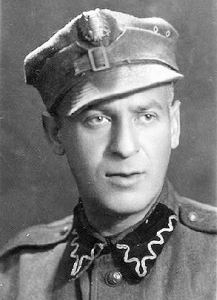
Moshe Dekel (Chaskelewicz) z”l was born in Munich to Krzepice Holocaust survivor parents. As a child, he tried asking his parents about their lives during the War years – and was met with silence. Dekel did not give up. As an adult, he tried to reveal the painful memories and secrets.
Having no one to ask, Dekel used radio programmes and newspaper articles to locate survivors, who knew a little about his parents. And so, from meeting to meeting, Moshe reveals a little more and another scrap of information from the past his parents had wished to conceal.
Dekel documents the exciting meetings and surprising stories he heard in his book “Beyond Silence” – a book which has turned into a sort of quest for roots, or a fascinating detective story, which traces the experiences of his family members and of Polish Jewry as a whole. Anyone who grew up in the home of Holocaust survivors can identify with it.
This quote comes from the book’s editor and publisher, Orly Amit. It is obviously the personal story of a man on a quest for his roots. However, it does contain a great deal of information about Krzepice and the vicinity, including Częstochowa.
In the absence of any formal Krzepice Yizkor Book, it has been decided to treat it as a “pseudo Yizkor Book”, to translate it into English and to publish it, here, on our website.
To this end, our translator, Dave Horowicz-Larochette, wrote to Orly Amit, seeking permission to do this.
Orly’s reply came prompty, stating:
Moshe Dekel z”l, to our great sorrow, passed away about a year and a half ago. I have approached his wife Zahava and she has given her permission to translate the book. She says that her husband, Moshe z”l, would have certainly agreed and would also have rejoiced in the initiative which originates from a desire to commemorate communities and to document the events of the Holocaust.
We sincerely thank Zahava Dekel for giving us permission to translate and publish her late husband’s book and Orly Amit for assisting us in this endeavour. We have made every effort to convey, in English, what her late husband expressed in Hebrew.
(The picture in the top left-hand corner is that of Moshe’s father, Majer Chaskelewicz z”l, in Polish Army uniform.)
This “pseudo Yizkor Book” has now been PROFESSIONALLY translated into English
– in its entirety – for the FIRST TIME!
The professional English translation of this Krzepice “pseudo Yizkor book” has been made possible by the financial support of the

Wolf Rajcher z”l and Dora Rajcher z”l were both Holocaust survivors from Częstochowa.
They were prisoners in both the “Big Ghetto” and the “Small Ghetto” and, until liberation, were slave labourers in HASAG-Pelcery. Following the War, they emigrated to Melbourne Australia.
Upon the passing of both his parents, their son, Andrew Rajcher, established this charitable fund in their memory.
Chapters are listed in the order in which they appear in the Yizkor Book.
(The numbers in brackets, after each article, correspond to the appropriate page numbers in the booklet.)
ENGLISH TRANSLATION:
Dave Horowitz-Larochette
IMPORTANT NOTICE
While this English translation is available for download, it may not, either in part or as a whole, be distributed or published without the prior written permission of Andrew Rajcher, this English-language version copyright-holder.
The Prospect of a Krzepice Yizkor Book
The Prospect of a Krzepice Yizkor Book (1963)
- a Matzevah for the Town of Krzepice and the Vicinity
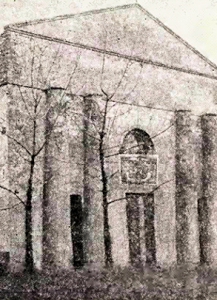 The town of Krzepice lies in the Kłobuck County of the Śłąsk Province of Poland – around 17.5 kilometres from Częstochowa. At the outbreak of World War II, the town’s population was approximately 5,000 – 45% of whom were Jews.
The town of Krzepice lies in the Kłobuck County of the Śłąsk Province of Poland – around 17.5 kilometres from Częstochowa. At the outbreak of World War II, the town’s population was approximately 5,000 – 45% of whom were Jews.
In 1941 and at the start of 1942, skilled Jewish labourers were selected in the Krzepice ghetto and deported to the ghetto in Częstochowa. On 22nd June 1942, the majority of the Jews in Krzepice were deported to the Auschwitz-Birkenau extermination camp. The remainder were deported to the Sosnowiec ghetto from where, later, they too were sent to Auschwitz-Birkenau.
Krzepice’s last remaining Jewish resident passed away in 1993.
In 1963, the Organisation of Krzepice and Vicinity Jews in Israel formed a Yizkor Book Committee and compiled this booklet, the main purpose of which was to appeal to Krzepice landsleit, around the world, to submit material for a proposed Krzepice Yizkor Book.
Included in the booklet is a chronological timeline of the history of the town of Krzepice, a brief history of the Kuźniczka Shule and an outline of the chapters to be included in the proposed Krzepice Yizkor Book.
However, there is no sign of any Krzepice Yizkor Book – either online or in any online library catalogues where it would be expected to have been included. We suspect that the proposed Yizkor Book may have never actually been written but, if anyone knows of its existence or can shed any light on why the project never actually went ahead – please contact our Webmaster. (Click on the envelope icon at the top of this page.)
[Webmaster: Much of this booklet is written in Yiddish and duplicated in Hebrew.]
This Yizkor booklet has now been PROFESSIONALLY translated into English in its entirety
– for the FIRST TIME!
The professional English translation of this Krzepice Yizkor booklet has been made possible by the financial support of the

Wolf Rajcher z”l and Dora Rajcher z”l were both Holocaust survivors from Częstochowa.
They were prisoners in both the “Big Ghetto” and the “Small Ghetto” and, until liberation, were slave labourers in HASAG-Pelcery. Following the War, they emigrated to Melbourne Australia.
Upon the passing of both his parents, their son, Andrew Rajcher, established this charitable fund in their memory.
Chapters are listed in the order in which they appear in the Yizkor Booklet.
(The numbers in brackets, after each article, correspond to the appropriate page numbers in the booklet.)
A repetition, in Hebrew, of what was written, in Yiddish, on pages 3-5 (6-7)
A repetition, in Yiddish, of what was written, in Hebrew, on pages 8-9 (21-23)
ENGLISH TRANSLATION:
Dave Horowitz-Larochette
IMPORTANT NOTICE
While this English translation is available for download, it may not, either in part or as a whole, be distributed or published without the prior written permission of Andrew Rajcher, this English-language version copyright-holder.
The Book of Częstochowa - Volume 2
The Book of Częstochowa (1968) - Volume 2
Sefer Czenstochow
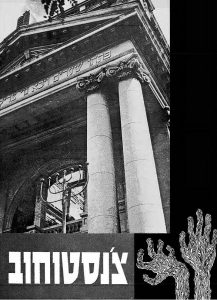 According to Dr.hab.Magdalena Ruta of the Department of Jewish Studies of the Jagiellonian University in Kraków:
According to Dr.hab.Magdalena Ruta of the Department of Jewish Studies of the Jagiellonian University in Kraków:
In 1967-1968, a two-volume work was published in Jerusalem. In both Yiddish and Hebrew, it was entitled Sefer Czenstochow [The Book of Częstochow] and was edited by M. Szucman. Its contributors included such well-known names as Jakub Szacki (dec. 1956), Szlomo Waga and Dawid Koniecpoler.
The first volume contains articles about the history of the Jews in the city (by J. Szacki and Sz. Śpiwak), which were divided by topic: Jewish communal institutions in the 19th and 20th centuries, political movements, charitable institutions, commercial life, education and culture, religious life, as well as portraits of individuals associated with the religious life. Pages 637-760 contain the memoirs photographs of people associated with the city.
The second volume is devoted to the Holocaust and the functioning of the ghetto, e.g. religious life, the children, party organisations, etc. Other wartime topics include deportations to Treblinka, the mass murders, Polish-Jewish relations (e.g. the chapter entitled Mencsclecher tat fun a poilisher froi [The Humane Response of a Polish Woman] by Szmuel Niski), the resistance and uprising in HASAG, Jews in the city following liberation, portraits of Częstochowa Jewish activists in the diaspora, landsmannschaften in Israel, the USA, Canada, Argentina, Australia and Paris. The book contains the memoirs of individual people (pp. 285−325), including shorts texts about the co-authors of previous memorial books – E. Chrobołowski, Rafael Federman, Prof. Wolf Lesław and Josef Kojfman. A part of the book is devoted to neighbouring Jewish communities in Krzepice, Żarki, Kłobuck, Lelów, Kamyk, Janów, Olsztyn, Mstów, Pajęczno and Koniecpol. The illustrated material includes pictures of the city, people and activities, copies of various documents, as well as maps.
There is no English translation of this book. [Webmaster: until NOW!]
FOR THE FIRST TIME,
both complete volumes of this Yizkor book
have now been PROFESSIONALLY translated into English.
The professional English translation of this two-volume Yizkor book has been made possible by the financial support of the

Wolf Rajcher z”l and Dora Rajcher z”l were both Holocaust survivors from Częstochowa.
They were prisoners in both the “Big Ghetto” and the “Small Ghetto” and, until liberation, were slave labourers in HASAG-Pelcery. Following the War, they emigrated to Melbourne Australia.
Upon the passing of both his parents, their son, Andrew Rajcher, established this charitable fund in their memory.
VOLUME 2
Click on SECTION HEADINGS to reveal chapters.
Chapters are listed in the order in which they appear in the Yizkor Book.
(The numbers in brackets, after each article, correspond to the appropriate column numbers in the volume.)
To view this Yizkor Book in its original Yiddish/Hebrew format
click HERE.
ENGLISH TRANSLATION:
Dave Horowitz-Larochette
IMPORTANT NOTICE
While the English translation is available for download, it may not, either in part or as a whole, be distributed or published without the prior written permission of Andrew Rajcher, the English-language version copyright-holder.
Other fully or partially translated
Częstochowa Yizkor Books are available on

Click HERE to view them
The Book of Częstochowa - Volume 1
The Book of Częstochowa (1968) - Volume 1
Sefer Czenstochow
 According to Dr.hab.Magdalena Ruta of the Department of Jewish Studies of the Jagiellonian University in Kraków:
According to Dr.hab.Magdalena Ruta of the Department of Jewish Studies of the Jagiellonian University in Kraków:
In 1967-1968, a two-volume work was published in Jerusalem. In both Yiddish and Hebrew, it was entitled Sefer Czenstochow [The Book of Częstochow] and was edited by M. Szucman. Its contributors included such well-known names as Jakub Szacki (dec. 1956), Szlomo Waga and Dawid Koniecpoler.
The first volume contains articles about the history of the Jews in the city (by J. Szacki and Sz. Śpiwak), which were divided by topic: Jewish communal institutions in the 19th and 20th centuries, political movements, charitable institutions, commercial life, education and culture, religious life, as well as portraits of individuals associated with the religious life. Pages 637-760 contain the memoirs photographs of people associated with the city.
The second volume is devoted to the Holocaust and the functioning of the ghetto, e.g. religious life, the children, party organisations, etc. Other wartime topics include deportations to Treblinka, the mass murders, Polish-Jewish relations (e.g. the chapter entitled Mencsclecher tat fun a poilisher froi [The Humane Response of a Polish Woman] by Szmuel Niski), the resistance and uprising in HASAG, Jews in the city following liberation, portraits of Częstochowa Jewish activists in the diaspora, landsmannschaften in Israel, the USA, Canada, Argentina, Australia and Paris. The book contains the memoirs of individual people (pp. 285−325), including shorts texts about the co-authors of previous memorial books – E. Chrobołowski, Rafael Federman, Prof. Wolf Lesław and Josef Kojfman. A part of the book is devoted to neighbouring Jewish communities in Krzepice, Żarki, Kłobuck, Lelów, Kamyk, Janów, Olsztyn, Mstów, Pajęczno and Koniecpol. The illustrated material includes pictures of the city, people and activities, copies of various documents, as well as maps.
There is no English translation of this book. [Webmaster: until NOW!]
FOR THE FIRST TIME,
both complete volumes of this Yizkor book
have now been PROFESSIONALLY translated into English.
The professional English translation of this two-volume Yizkor book has been made possible by the financial support of the

Wolf Rajcher z”l and Dora Rajcher z”l were both Holocaust survivors from Częstochowa.
They were prisoners in both the “Big Ghetto” and the “Small Ghetto” and, until liberation, were slave labourers in HASAG-Pelcery. Following the War, they emigrated to Melbourne Australia.
Upon the passing of both his parents, their son, Andrew Rajcher, established this charitable fund in their memory.
VOLUME 1
Click on SECTION HEADINGS to reveal chapters.
Chapters are listed in the order in which they appear in the Yizkor Book.
(The numbers in brackets, after each article, correspond to the appropriate column numbers in the volume.)
To view this Yizkor Book in its original Yiddish/Hebrew format
Click HERE.
ENGLISH TRANSLATION:
Dave Horowitz-Larochette
IMPORTANT NOTICE
While the English translation is available for download, it may not, either in part or as a whole, be distributed or published without the prior written permission of Andrew Rajcher, the English-language version copyright-holder.
Other fully or partially translated
Częstochowa Yizkor Books are available on

Click HERE to view them
Czenstochov
Czenstochov (1958)
A New Supplement to the Book "Czenstochover Yidn"
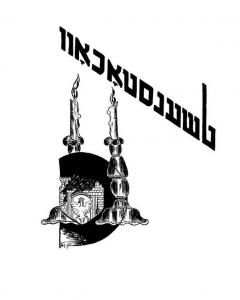 This Yizkor Book was published as a supplement to the Yizkor Book “Czenstochover Yidn”, which was published in New York in 1947.
This Yizkor Book was published as a supplement to the Yizkor Book “Czenstochover Yidn”, which was published in New York in 1947.
According to this Yizkor Book’s Editors:
As the “United Czenstochover Relief Committee”, we had originally intended to publish a booklet in honour of our Częstochowa landsmann Raphael Federman, [who is] well‐known by all, to mark the 50th anniversary of his communal activity for the benefit of the public and, especially, for our hometown of old ‐ Częstochowa. At first, we planned to issue a booklet, on a modest scale ….
However, the response on the part of landsleit and friends everywhere, both here and in whichever other countries our landsleit find themselves, was so favourable, that we were forced to change the entire plan …. Jewish writers presented themselves with articles and memoirs and … we were forced to abandon the original modest project and, instead, we decided to publish a book the same size as “Czenstochover Yidn”, entitled ”Czenstochov”. And, as the reader may perceive, this current book is of no lesser value in important historical treatises than the first book, “Czenstochover Yidn” …..
May this book “Czenstochov” constitute an Eternal Monument to all those near and dear and always remind us of our old hometown’s spiritual heritage.
[Webmaster: As far as we know, this is the first COMPLETE, PROFESSIONAL, English-language translation of this book. To the best of our knowledge, prior to this, only a handful of chapters seem to have ever been translated into English.]
This Yizkor book has now been PROFESSIONALLY translated into English
– for the FIRST TIME in its entirety!
The professional English translation of this Częstochowa Yizkor book has been made possible by the financial support of the

Wolf Rajcher z”l and Dora Rajcher z”l were both Holocaust survivors from Częstochowa.
They were prisoners in both the “Big Ghetto” and the “Small Ghetto” and, until liberation, were slave labourers in HASAG-Pelcery. Following the War, they emigrated to Melbourne Australia.
Upon the passing of both his parents, their son, Andrew Rajcher, established this charitable fund in their memory.
Click on SECTION HEADINGS to reveal chapters.
Chapters are listed in the order in which they appear in the Yizkor Book.
(The numbers in brackets, after each article, correspond to the appropriate page numbers in the book.)
DEVELOPMENT AND DESTRUCTION
PERSONALITIES, REMEMBRANCES AND PORTRAITS
LITERATURE AND REVIEWS
OUR JUBILEE CELEBRANTS
CZĘSTOCHOWERS IN AMERICA AND IN OTHER COUNTRIES
IN MEMORY OF CZĘSTOCHOWA LANDSLEIT AND LEADERS IN AMERICA
IN MEMORY OF THE CZĘSTOCHOWA JEWS WHO WERE ANNIHILATED
– SAINTS, HEROES AND MARTYRS
INDEXES
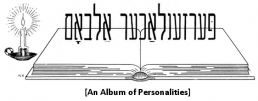
ENGLISH TRANSLATION:
Dave Horowitz-Larochette
IMPORTANT NOTICE
While this English translation is available for download, it may not, either in part or as a whole, be distributed or published without the prior written permission of Andrew Rajcher, this English-language version copyright-holder.
About the Częstochowa Yizkor Books Project
About the Częstochowa Yizkor Books Project
- preserving the words of our Holocaust Survivors for future generations
PROJECT BACKGROUND
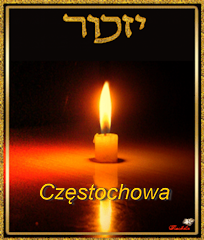 Yizkor Books were, in the main, written by Holocaust Survivors, from the late 1940’s through to the 1960’s. Once this Holocaust Survivor generation is no longer with us, these books will enable these Survivors to continue to talk to us “from beyond the grave”.
Yizkor Books were, in the main, written by Holocaust Survivors, from the late 1940’s through to the 1960’s. Once this Holocaust Survivor generation is no longer with us, these books will enable these Survivors to continue to talk to us “from beyond the grave”.
These books are an important resource for research by historians and genealogists, as well as for the Survivors’ descendants when tracing family history or their own genealogy.
HOWEVER, it must be said that they cannot be entirely relied upon as definitive resources. They do contain some errors and inaccuracies regarding people, places, dates and times. This is quite understandable as:
-
- often articles have been written twenty or more years after the events described have taken place and, while Holocaust memories are certainly burnt into the consciousness of Survivors, the accuracy of the details associated with these memories may fade;
- a Survivor’s memory has become interwoven with other Survivors’ recollections and certain details have become less accurate in what has become a “collective memory” (Research into the fast-growing field of memory studies shows that collective memories evolve and may differ at various moments in time.);
- certain events have been witnessed from a personal perspective only and can, obviously, only be written about from that perspective and not from an overall, historical context;
- Yizkor books, as a rule, are compilations of the works of many different authors, each with his/her own world view (some of which may seem quite extreme to today’s “politically correct” reader), and with his/her own distinctive literary style and capability.
ENGLISH TRANSLATIONS
Most of the Yizkor Books relating to Częstochowa and the surrounding area have, to some degree or another, been translated into English – except for Sefer Częstochowa which has only now been translated into English for the first time.
The English-language translation of all books has been and will be carried out by a PROFESSIONAL translator. The translation is ACCURATE, COMPLETE and, where historical discrepancies have arisen, they have been referred to historians for clarification and, while what has been written has been translated accordingly, a footnote has been added to indicate that there is an historical discrepancy.
We should not treat possible inaccuracies just as mistakes. They reflect the opinions of the people who wrote and/or edited the articles/chapters at the time of their publication. Yizkor Books give us information not only about the times they present, but also about the times when they were written. If scholarly research or other sources provide more accurate descriptions of events, we can provide them, also, as a footnote.
This is the manner in which translations of our Yizkor Books SHOULD and MUST be carried out, in order to meet professional standards and to withstand possible critical reading into the future.
HOWEVER, this has not always been the case with past English-language translations of other Częstochowa Yizkor Books. After consulting various historians and researchers, it has been found that:
-
- some Yizkor Books have only been partially translated, i.e. some of the articles/chapters have not been translated at all;
- quite often, translations have been done by well-meaning amateurs and not by professional translators;
- where amateur translations have been done, translation errors have been found and the English stylistics sometimes leaves a little to be desired. More importantly, when a paragraph or passage seems too difficult or complex, it has sometimes been OMITTED from the translation altogether!
According to Dr. hab. Magdalena Ruta of the Department of Jewish Studies of the Jagiellonian University in Kraków:
Many of them have been translated into English – if not entirely, then in fragments.
These translations […] have been done by volunteers […]. As a result, the English language versions of these memorial books contain numerous factual errors, mistakes in the names of places and of people, shortcuts and/or omissions. They should therefore be treated with caution, even distrust and should be strictly compared with the original text and with other historical sources.
Of course, the above comments are very general in nature and are not intended to reflect on any specific past translator or any specific translation.
THIS PROJECT INTO THE FUTURE
When translating them into English, we owe it to our Holocaust Survivors and to their ancestors to have their words translated ACCURATELY, CORRECTLY and COMPLETELY.
We also owe that to FUTURE GENERATIONS, so that they are able to read the words of their ancestors – again, ACCURATELY, CORRECTLY and COMPLETELY.
So, after our first Yizkor Book English-language translation was completed, it was decided to engage our translator to translate, FROM ZERO, all the other Yizkor Books relating to Częstochowa and the surrounding area.
This would be far more cost-effective than to look at what had already been translated and then to compare it with the original text.
It should be noted that some smaller towns in the Częstochowa region, such as Krzepice, have never had an “official” Yizkor Book published about them. In these cases, where appropriate personal memoirs have been written and published, we will consider treating them as “pseudo Yizkor Books”. We will translate them into English also and publish them here.
As they are completed, all English-language translations are posted onto our website for all to read and/or download.
We have an EXCELLENT, PROFESSIONAL TRANSLATOR in Dave Horowitz-Larochette, who is very competent in translating from both Hebrew and Yiddish. Most importantly, he has an exceptional eye for detail and takes immense pride in the quality of his translations. Far above and beyond the call of duty, as he translates, he ensures that, wherever possible, names and places are spelt correctly and, where historical dates and/or facts are not accurate, he raises these issues for them to be corrected within footnotes.
Of course, professional translations cost money and we are pleased to advise that all costs regarding this project are covered by the WOLF & DORA RAJCHER MEMORIAL FUND.
Click HERE to return to Częstochowa Yizkor Books Project main page.
The Częstochowa Yizkor Books Project has been made possible by the financial support of the

Wolf Rajcher z”l and Dora Rajcher z”l were both Holocaust survivors from Częstochowa.
They were prisoners in both the “Big Ghetto” and the “Small Ghetto” and, until liberation, were slave labourers in HASAG-Pelcery. Following the War, they emigrated to Melbourne Australia.
Upon the passing of both his parents, their son, Andrew Rajcher, established this charitable fund in their memory.


